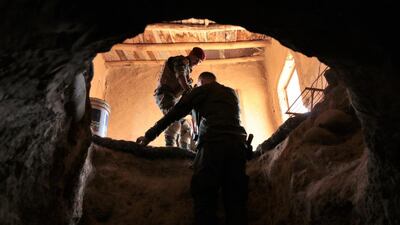KANASH, IRAQ // The missile pierced the concrete roof before exploding, charring the walls and sending the contents of the room flying. Metal bed frames lie twisted, kitchen utensils and machine-gun cartridges litter the floor.
Arabic scrawls on the wall are barely visible but leave no doubt as to the building’s last occupants. ISIL fighters had turned the house into a base, cooking on a simple gas stove in the adjacent kitchen, reading propaganda literature and condensing its content into simple slogans on the fading paint of the wall.
The scene of destruction does not reveal the fate of the militants who were stationed in the village of Kanash, where they faced off with the peshmerga on the Gwer front until the Kurds overran their positions in August. A leather jacket still hanging next to a fridge in another room points to an untimely end, or perhaps to a hasty departure.
If the extremists managed to escape before the building was hit, they could have done so without emerging into the open: a few metres from the fridge, a hole in the floor leads into a deep tunnel cut into stony earth.
The warmth of the bright autumn day has not permeated into this cool, narrow shaft, nor is there a source of light. A wire connects a few unlit bulbs that have somehow been attached to the brittle surface.
The dark tunnel winds through the earth until it ascends to a nearby building, allowing the insurgents to move unseen from one defensive position to another, shielded from air strikes by the surrounding earth.
As the operation to liberate Mosul from ISIL unfolds, Iraqi and Kurdish forces are becoming all too familiar with such tunnels, which form an integral part of ISIL’s defences. A shortage of manpower and relentless coalition air strikes have forced the militants underground and to adopt guerrilla tactics to try to stall their opponents’ advance.
In the villages and towns that have been taken since the Mosul operation officially got under way on October 17, a web of tunnels allowed the insurgents to shift positions, popping up unexpectedly to ambush the advancing troops. The underground network also offers protection from the bombardment that typically precedes an attack.
Often, militants wait until their enemies believe that a town or village has been secured before emerging to launch suicide attacks or snipe at unsuspecting soldiers. The danger is compounded by improvised explosive devices that litter streets and buildings.
“Taking the village was very difficult. We had to be careful about the IEDs, the snipers and the tunnels,” says Col Srud Barzinji, the commander who led the peshmerga capture of Kanash.
The colonel recounts one incident during the fighting that left his troops puzzled.
“We followed a guy to a house and he disappeared. Then we killed him further down at the river. Only later did we find out it was because of the tunnels,” he says.
With the front lines around Mosul almost static for the past two years, the militants have had ample time to prepare their defences on the Nineveh plains surrounding the city.
The lethal mix of tunnels, roadside bombs, booby traps and suicide bombers will also constitute the defence of the city itself. At present, ISIL seeks only to delay the overwhelming forces that are descending on Mosul, leaving only a skeleton defence on the approaches to the city.
That will change once Iraqi forces enter the city, where the extremists’ resistance is expected to be much fiercer. If the liberation of the city is to succeed, the attackers will do well to adapt to this way of fighting, and remember the lessons learnt on the long road to Mosul.
foreign.desk@thenational.ae

